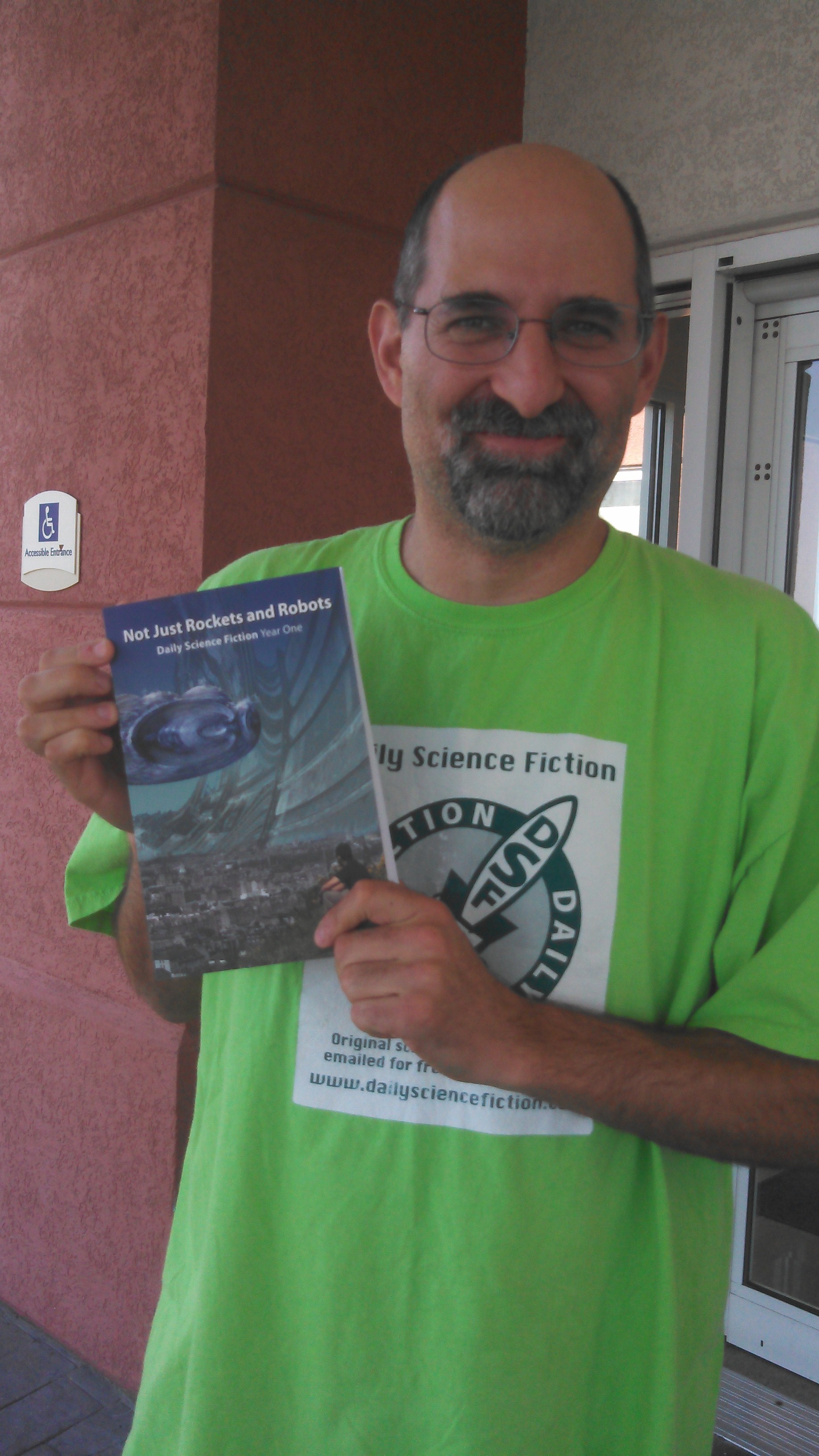written by Frank Dutkiewicz
This marks the end of Daily Science Fiction‘s first year run. We have managed to read and review every story for you. It saddens me that no one else has bothered to do that (at least none who I am aware of), but a lack of reviews hardly is an indication of a publications success. More on that laterâ€
The Stories
“Hints of the Apocalypse” by K.G. Jewell (debut 8/1 and reviewed by James Hanzelka)
Three people are discussing love, life and the end of the world, just minutes before the end of the world as they know it. It’s not a discussion in the traditional sense of the word, but a series of flash fiction vignettes dealing with the subject.
This story reminded me of an old Twilight Zone episode where a demented man brings together three people who he believes has wronged him before the world is destroyed. In the twilight zone episode, however, it’s all in his mind. In this story the end is know up front, only how we get there is unknown. Nice story, cleverly crafted.
“Trails” by James Bloomer (debut 8/2 and reviewed by James Hanzelka)
Clarke meets Anna at a Trails art party, a party to appreciate the artistry created by the tracking devices everyone uses. It turns out however it’s really a party to eliminate the tracking devices controlling everyone’s lives. When the authorities show up to arrest everyone “going off the Grid.” Will Clarke and Anna be thrown into camps or can they save themselves?
This story is very similar to one which won a “Writers of the Future” contest a few years back. A cautionary tale of how technology, which is supposed to help us, is controlling our lives. In both stories it is a trail back to less technology that is the key to survival. Good story, pretty well crafted.
When I was asked to review “Exit Interview” by Patrick Johanneson (debut 8/3 and reviewed by Anonymous), I was pleased as I clearly remembered reading it the day it arrived in my inbox–always a good sign. I enjoyed it as much reading it a second time. I just love the opening paragraph:
Stella Laine, deputy head of Human Resources, tented her fingers, looked me in the eye, and said, “Your time on Earth is nearly up, Benjamin.”
For a couple seconds I couldn’t stop blinking. Finally I got my eyelids back under conscious control, and, with what I thought was a heroic lack of quaver to my voice, I said, “Do you really have that kind of power?”
As you may suspect the story is an interview–albeit a rather surreal one–between an employee and a human resources officer.
I really enjoyed the story. I thought it was well written, interesting, with good dialogue and humour sprinkled throughout. In fact I have nothing negative to say. A simple idea, well executed.
Recommended
The son of a woodworker is drawn toward a strange girl wearing a wooden dress in “The Girl in the Wooden Dress” by Angela Rydell (debut 8/4). Emmett spots the girl standing at the edge of the forest. Her dress is lovelier than any stick of furniture he ever laid eyes on. The lovely girl in the form fitting dress tells a tale of the forest taking her in and protecting her in her time of need. But now that she has grown, the forest won’t let her leave. She must shed her dress but needs the young woodworkers help.
“The Girl in the Wooden Dress” is too short. I was completely taken in by this electric tale. I thought the writing was great and the story exciting. How I wish it were longer.
Recommended
“The Last Librarian: Or a Short Account of the End of the World” by Edoardo Albert (debut 8/5) is the tale of a keeper of a library of rare books. The protagonist is a friend of the librarian. When an unknown copy of a T.E. Lawrence is rediscovered on its shelves, the previously empty library gets a sudden influx of researchers.
“The Last Librarian” is the tale of a curator who values books above his fellow man. In fact, he judges men based on how they treat their books. This futuristic society has little need for books. However, the librarian’s stores have a value of its own. Disrespect the sum of what makes man unique and you have worn out your usefulness.
This tale pulled me but had a twist that was more of a cheat as far as I was concerned. I did not appreciate the ending but did like how the story unfolded.
“The Recruiter” by John Robert Spry (debut 8/8 and reviewed by Anonymous).
A man in a coffee shop tells an attractive woman about the process of alienation that lead to him becoming an actual alien. In his opinion, some children become aliens via a process of continual childhood disappointments and tragedy, resulting in people who look human, but are no longer human. He seems to relish the fact she is listening to his story and his presentation of himself as an dangerous alien. Of course, things are not as simple as they appear and her offer to continue their discussion the next day may not be exactly what he had in mind…
This story was well written, and carried me along but didn’t wow me. The premise of people being manipulated into becoming assassins isn’t new (The Manchurian Candidate), but this does deliver a speculative fiction twist that is quite nicely and subtly done.
It does play along some well-trodden paths in terms of references (JFK), giving the story, albeit briefly, a grander stage–an easy way to do that. In terms of a cost benefit analysis, I would have avoided that.
The author’s comment in “Killer Pot” by James Dorr (debut 8/9 and reviewed by Dustin Adams), “Cast as a conversation between two once-lovers…” helps to see the story in a different light. Perhaps imagining it as a scene from a play.
In this case, being a story, it’s difficult to latch on to what is happening. Because it’s a conversation, there’s no plot per se. Instead, there’s a few ideas mashed together in dialog.
There’s killer pot, the point of which I missed, and considering it’s the title of the story, I probably should have gotten it. There’s the vampire feel, which doesn’t go anywhere, and is befuddled by the mention of going outside, but covering up. Then there’s the interesting idea of someone being “bronzed” while alive, only with silver, not bronze, and smoking pot first, and taking an anesthetic…
I wanted to rate the story higher than one rocket, but I let my emotions get the better of me, which is to say how I felt about the story, and that is: ho-hum.
“The Box That Eats Memories” by Ken Liu (debut 8/10 and reviewed by Dustin Adams). I’ve heard said that when judging a story, there are those who don’t take the title into consideration. That the story should stand on its own. This is bunk.
The title of this story is what gets it started, and each word edges us closer toward a conclusion that is both harsh and justified.
Ken Liu brings us a strong idea, a far out concept, and delivers on it in short fashion. The box that eats memories, keeps the bad ones locked away, stored, and hopefully forgotten. Oh, but they are simply waiting.
I rated this story 5 of 7 rockets.
“A Gentlewoman’s Guide to Time Travel” by Alice M. Roelke (debut 8/11) is written as a warning to those in our past who are traveling to our now.
This cute tale is a reverse time traveler story. I found it fun.
The title explains it all in “How Amraphel, the Assistant to Dream, Became a Thief, Lost His Job, and Found His Way” by Scott Edelman (debut 8/12). Amraphel steals the dreams of mortals for his master, Lord of Dream. He waits by the bedside of the resting, waiting for REM sleep to arrive. He links with the unsuspecting and rides within in their dreams, seizing what he has experienced for his master.
Riding on the backs of a dreamer while they dream is an exhilarating experience. Amraphel is left empty when it is over. To pass the time between assignments, he sits a top of a barstool at his favorite tavern talking shop with his two friends, assistants to the Lord of Love and the Lord of Luck respectfully. Amraphel has often told of the richness of the dream experience while his friends speak of love and luck. Eager to share with his friend’s gifts, Amraphel conceives a plan, one that breaks every rule and has dire consequence if they are caught.
The premise to “How Amraphel” centers around three people who are not quite human. What they exactly were was never explained to my satisfaction, but they all appear to have jobs that determine the fate of mankind. The gifts they dish out are beyond their immortal souls to manufacture. Only when they ‘bless’ a human with their gift do they get a glimpse of what mortals experience. The three assistants only get a taste of their own assigned gifts, so conspire to experience each others’ talents.
I found it odd how beings who couldn’t dream, feel love, or grasp the concept of luck could act so human. How could they be absent of the basic components of what makes us human yet are able to form a novelty concept like friendship? Why even bother going to a tavern to get drunk? It would seem these assistants – who lack dreams, love, and luck – would be incapable of the aspirations to be able to conspire to better themselves, or even would be willing to get loaded as a way of dealing with their problems.
Despite my personal conflict with the plot, I found the opening scene to be a very sharp hook. Solid writing indeed. Too bad the rest couldn’t have pulled me in like it did.
In “Spoons” by Joseph Zieja (debut 8/15 and reviewed by James Hanzelka), Maela obsesses over which spoon to use for breakfast. The variety of spoons is in contrast to the rest of her life, be it food or relationships. But today is an eventful day, her first time joining. Can that add more dimension to her life?
This story was a little slow and definitely not for everyone. It uses the every day to give us a glimpse into a possible future where life is as bland as the white porridge Maela has for breakfast every day. It is also a treatise on how even the mundane would appear novel to us.
“Our Drunken Tjeng” by Nicky Drayden (debut 8/16 and reviewed by James Hanzelka).
Li and Kae are caretakers performing maintenance on the body of the Fathership. It is exacting work and the Fathership is like us, caught up in our pleasures and comforts at the expense of its body. The caretakers have a full time job to prevent the Fathership killing himself.
This story is not for everyone. It is highly stylized and fairly graphic. It is an interesting take on perspective. It also can be interpreted in several ways. Taken straight up as a story about the caretakers, or as a metaphor for life itself.
When Jacob arrives at the scene of a recent suicide by a Hollywood actress in “True Hollywood Story” by Ryan Gutierrez (debut 8/17 and reviewed by Dustin Adams), he is reluctantly granted access to the body. Carrying only a bag, we don’t yet know what he’s there to do. Hints are given that memory is lost after a short time, and a shot to the head really makes things difficult for him.
I won’t ruin the surprise, but Jacob is indeed there to link to, and work directly with, the memories of the deceased. This is his job.
Great story, written well, nifty idea, and fun/unexpected twist at the end made this offering a pleasure to read.
I rated this story 6 of 7 rockets.
In “Reading Time” by Beth Cato (debut 8/18 and reviewed by Dustin Adams), A longer than expected nuclear winter has an ordinary family of four huddled within a library. They’ve burned every scrap of furniture, all that’s left are the books.
This is the last straw for the family’s patriarch. Among other reasons, the children having more food being one of them, he fashions a noose, and stands ready.
Although I felt his action a little extreme, the situation made it believable, and the reasons to continue, provided by the matriarch, were just as convincing a reason to stay as the solution the daughter (main character) provides.
Reading Time is a well drawn short story, and as all post-nuclear stories, frightening in it’s possibilities.
I rated this story 4 of 7 rockets.
“What Never Happened to Kolay” by Patricia Russo (debut 8/19) is tale of a life and of the opportunities never pursued. Signs of things to come shroud young Kolay when the flowers of Grannie Brian’s garden shun him alone while they hug the other children who play within their rows. As years pass, paths of destiny open to Kolay; paths he fails to pursue. Life passes him by, until his own people shun him, just like the flowers of his youth.
“What Never Happened” is the tale of a non-starter. Kolay is a person everyone knows. The quiet guy who sits alone, keeps to themself, does their job, and goes home. Never interacting with their colleagues. Never maintaining relationships. The fellow who is as unassuming as the bland wallpaper around them. In this speculative tale, real opportunities are offered. Relationships aren’t pursued. Ailments that inflict him later in life are ignored instead of cured. Kolay chooses to never make a choice.
Judging by the way this tale ended, I believe Ms Russo intended a climactic moment to be a commentary of how the pariahs of society have a purpose. After all, even the scary hermit down the road may be useful as the watchful eyes of the neighborhood. The author, I think, aimed to tweak our sympathetic nature and have pity on poor Kolay. Pity is what we can give, but loners like Kolay build their own dens of solitude. We feel sorry for the path they took, but it is their path so we comply by avoiding to tread on it, just as the characters did in this tale.
“What Never Happened to Kolay” is a story of emptiness. Read it, have pity, and live your life knowing you’ll never suffer Kolay’s fate.
What a fun story! In “Alpha & Omega: A Co-creative Tale of Collaborative Reality” by Joshua Ramney-Renk (debut 8/22 and reviewed by Anonymous) we have the monkeys and the typewriters premise, but instead of Shakespeare they write something else. I usually summarise stories when I review them, but this one is exceedingly short and I think I’ve said enough.
I thought this was a witty, sharply done piece. I liked the authorial commentary that threaded throughout the story and the simplicity of the story itself. Not the freshest premise, but superbly executed.
Recommended.
Elian returns to the place of birth in “The Standing Stones of Erelong” by Simon Kewin (debut 8/23). Her foster mother, Mayve, brings Elian to the spot where she last saw Elian’s family. The stones stand in a circle. Elian knows them as her mother made Mayve sing Elian a nursery rhyme, a riddle, of the strange artifact. Elian stands among the stones, contemplating what the mysterious rhyme meant.
“The Standing Stones” starts off with Mayve retelling the day Elian was born. Her brave family holding off deadly Marauders while her mother gives birth. Mayve and the newborn Elian are the only ones to escape. Now a young woman, Elian wishes to reconnect with her family, touching the cold stones while contemplating of their meaning. Suddenly, with the touch of an out of place stone, coupled with memories of the nursery rhyme, all becomes clear.
I am going to be blunt with my assessment. This tale was excellent.
Recommended.
In “Passage” by Lavie Tidhar (debut 8/24 and reviewed by Anonymous) we follow a young American teacher who lives on the Island of Vanatu teaching English to the islanders. While he is there he hears about an infection spreading across America turning average people into mindless drones hungry for human flesh–zombies, although the word is never mentioned (which is odd). The story is really about the young man coming to terms with the news and finding a new place for himself in the world.
Zombie stories are a notoriously hard sell–a bit like vampire stories; so many are written that stories really have to stand out to sell, especially to pro-markets. I can’t say this was a standout zombie story for me. The only thing that stood out was that it was written by a Name Writer. I have read some of Lavie Tidhar’s work and loved it (“Spider’s Moon” springs to mind). That said, the prose was tight and the story meandered to the end with little snippets of insight into the character’s personality. Aspects of it–description–were well done. Nothing really happens apart from the passage of time and the guy dealing with the news.
In the end it was like processed cheese–okay, bland, formulaic but I’ve had better.
Love is paper thin in “Heart on Green Paper” by Gra Linnaea (debut 8/25). The two people in this tale are a couple who share a life together. He loves her. She can’t live with him or without him. She leaves him and constructs a living paper origami replica of him; a crude facsimile that fades faster than real love.
“Heart” is a weird story. I believe Mr Linnaea wrote it that way but its oddness made it difficult for me to get into it. The murky/ill-defined relationship didn’t help it. But I did find the magical solution for a dysfunctional woman to deal with her dysfunctional relationship oddly appealing, and like most relationships like this, life goes on even when events turn so strangely.
“Inside Things” by Melissa Mead (debut 8/26 and reviewed by Dustin Adams) is a complex tale given its relatively short length. Each word counts in this lovely tale of an autonomous protector who wants to know and be more.
The eternal guardian, like the dragons of lore, protects her mistress from any who would seek to do her harm, or steal her treasures. Yet one young girl passes through the illusions and deadly traps to confront the guardian.
A deep desire to know more than the physical, and to learn, encourages the guardian to allow the girl safe passage to the mistress. The mistress, whose physical body has expired, is in need of a new one. But there is a problem… The body, that of the girl, has been poisoned – by the guardian herself.
I rated this story seven out of seven rocket dragons.
“Distilled Spirits” by Andrew Kaye (debut 8/29 and reviewed by Dustin Adams) give us, in short fashion, the delicious idea that after we’re gone, our soul manifests in a manor fit to drink, and that traditionally, family members drinketh from the cup.
At Great Aunt Abigail’s funeral, young Kate must drink for the first time. Having had a difficult life, Abigail’s soul tastes fairly rancid. However, it is imagined that of her son Reed, the family troublemaker, would taste even worse.
Short and original, Distilled Spirits is worth a read. It even comes with a nifty punchline to send us off smiling.
I rated this story seven out of seven rocket dragons.
Warning: “Rules for Living in a Simulation” by Aubrey Hirsch (debut 8/30 and reviewed by Anonymous) is not a storyâ€
It’s true–it’s more a set of rules and extrapolations based on the premise that we live in a simulated universe. It is, as the title suggests exactly.
I quite like what the author has done here, and there are moments that make you smile and, though it has been handled skillfully, but it isn’t a story, so it had little emotional impact. DSF have published a few similar stories–one about a cocktail menu is on the edge of my memory–and though I often enjoy the prose and skill, I am left unsatisfied by the lack of story.
The devil visits a man who has everything in “What Are You Singing About?” by T.J. Berg (debut 8/31). The devil asks what the protagonist wants. Our man has everything he needs; a happy home life, wonderful family, and perfect health. The devil can offer him nothing, except the one thing not conducive to his wonderful life.
This very brief tale is a set up for a punchline.
Analysis
I have been more than impressed by the wealth of stories I have read on DSF over the past year. The style and genre have varied greatly but the quality has always remained high. Jonathan and Michele have proven to be excellent judges of talent. They have had no shortage of writers willing to contribute, many of whom who have been recognized for their work elsewhere and honored for it in the form of Nebula’s and Hugo’s.
The magazine has had a gradual increase in readership. Word of it has reached every corner of the speculative world (save maybe Tangent Online and Locus), with their recent SFWA qualifications. Most people would call this one-of-a-kind venue a success, but has it made it?
The answer of that question depends on your definition of the term but here is one accomplishment that might help you persuade your opinion. The list of contributing authors to DSF would make a great who’s who list for up and coming talent for speculative fiction, but what the magazine hasn’t had is what the big three routinely get; an icon of the industry, until now.
In a recent Facebook posting, legendary author, Mike Resnick, announced he sold his story, The Scared Trees, to DSF. No one, not Asimov, Clarke, or anyone else, has won , or been nominated , for as many awards in speculative fiction than Mike has. He is a draw in every convention he attends and likely will be a nominee for the next Hugo awards. He is Mr Science Fiction, so it is fitting that he would appear in a magazine that publishes one daily.
Let’s face it, if he would had offered that story to anywhere else, the publishers would have been wise to accept it, sight unseen. ÂThe fact he submitted it to DSF means that he has recognized DSF as a viable outlet to showcase his work. And that is good news to DSF‘s readers everywhere.
 My congratulations to Mr Anonymous. He is a very private man, so what the congrats are about is a highly guarded secret. Let’s just say it’s the type of news that could involve miniature baglets in his future.
My congratulations to Mr Anonymous. He is a very private man, so what the congrats are about is a highly guarded secret. Let’s just say it’s the type of news that could involve miniature baglets in his future.






